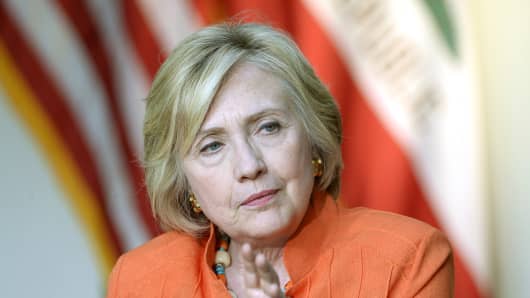Quick question: is there anything that could spell more trouble for the Hillary Clinton presidential campaign than her State Department email scandal?
Answer: Yes, and it's the markets.
Of course there's no way to know if the very recent downturn in the stock markets will last very long or even through the rest of the summer. But anyone with a strong historical knowledge of American electoral trends knows this: a falling market and/or a weakening economy is almost always a death blow to the incumbent party in the White House.
This recent downturn has been far too brief and it's far too removed from 2016 to make any specific pronouncements about what effect it will have on this election. But it does serve as a reminder that the markets and the economy have a much bigger influence over American presidential elections than scandals, foreign fears, or even wild comments about immigration.
Read MoreHey advertisers! 60 is the new 30
A short walk down memory lane confirms this fact. A close election in 2008 became a clear win for Barack Obama in 2008 when the markets and the economy took a sharp dive about two months before election day. The "dotcom bomb" selloff in early 2000 badly hurt Al Gore's campaign, and the recession of early 1990-91 derailed President George H.W. Bush's re-election hopes.
The reason is simple. Most American voters consider the economy to be the top issue in most elections. And if they perceive the economy to be bad or in trouble, they vote the incumbent party out of the White House. I say "perceive," because sometimes, the actual economic realities don't support the perceptions. In 1992 for example, the economy had already been recovering for a full year when Bill Clinton defeated President Bush. But when the election cycle started in earnest with the 1992 New Hampshire primary, that recovery was in its early and quiet stages and the voters had finalized their negative economic impressions of the first Bush administration well before election day.
That's where things can get really sticky for Mrs. Clinton or any other Democratic Party nominee. If we are indeed starting even a relatively short but noticeable market and economic cooling right now, it may not matter if it's mostly over with by this time next year. If we go into the Iowa caucuses and the New Hampshire primary in the middle of, or just coming out of, a downturn, it will be very hard for Secretary Clinton to explain how her economic policies would be significantly different than President Obama's. In fact, it would probably be harder for her to do that than explain away an email scandal that may or may not bring criminal charges.
Read MoreWant higher wages? Start with the troops!
On the flip side, the traditional role of the non-incumbent party candidate to talk down the economy gets a whole lot easier when the markets are indeed way down and employment numbers are shaky. For all the talk of how Mitt Romney and John Kerry were bad candidates, their biggest problem was that the economy was basically improving in the years they were trying to unseat incumbents. If the economy is seen as weaker as we begin 2016, all the GOP will have to do is present a viable candidate to the voters who needn't be any more impressive than Romney or Kerry. Several of the 19 or so Republicans now running can probably reach that low bar.
Again, none of these arguments are meant to say this is actually happening or going to happen. The point is there's no denying any real or perceived economic or market downturn would almost surely play a pivotal role that would likely derail the Democratic nominee in this upcoming election.
With that in mind, the Clinton team needs to stop monitoring Fox News to find its most serious campaign threats and change the channel to CNBC.



